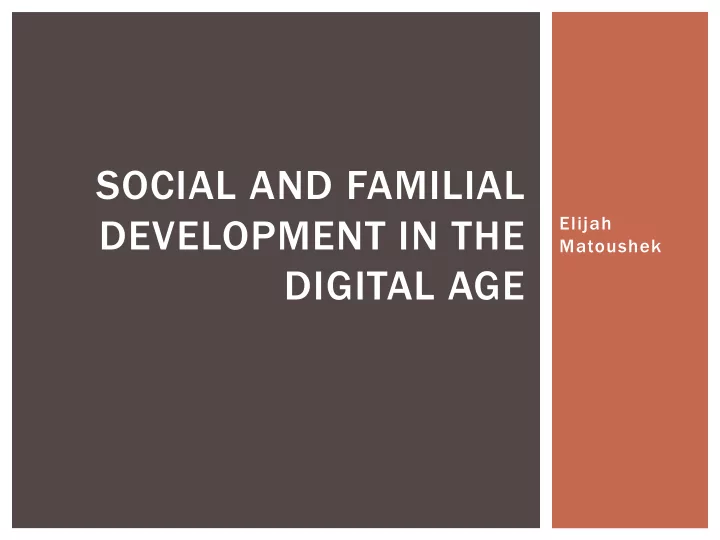

SOCIAL AND FAMILIAL DEVELOPMENT IN THE Elijah Matoushek DIGITAL AGE
CONCERNS THROUGHOUT HISTORY “Observations in the early 1950’s held that the television set froze the natural order of family interaction-talking, joking, arguing, catching up on the disparate experiences of each family member.” (Singer, 2012) TV’s give “more privatization of experience; the family may gather around the set, but they remain isolated in their attention to it.” ( Maccoby, 1951, as cited in Singer, 2012, p 342)
CHILDREN AND MEDIA “Research indicates that youth between the ages of 8 and 18 spend nearly 8½ hours per day consuming media.” (Kirsch, 2010) Children are a prime demographic for heavy media usage. Often children have the time, and imagination to enjoy all that media has to offer and their parent’s income to buy them the newest game or the newest smartphone when it comes out.
NEW FEARS “the most -successful sites and apps hook us by tapping into deep-seated human needs (Bosker , 2016).” “Technology is not, as so many engineers claim, a neutral tool; rather, it’s capable of coaxing us to act in certain ways.” (Bosker, 2016) It seems that smartphones have become the new prevailing worry of our digital age, their ease, addictiveness have met all of the criteria of a medium we feel we should be careful about.
SOCIALIZATION “these activities of constructing narratives and sharing stories about their daily life are considered to be powerful channels for their identity formation and socialization.” (Singer, 2012) Children are now able to find and interact with communities, message boards, as well as access information about the things that they like all from the comfort of their bedrooms.
ANXIETY “Individuals with anxiety may engage in excessive reassurance seeking to validate their self-worth or reduce intolerable feelings of uncertainty/worry through posting on social media sites more frequently to obtain comments and likes” ( Clerkin et al., 2013, as cited in Vannucci, 2017, p 166).
STRESS “Facets of social media use that may directly elicit stress responses include: (1) receiving negative feedback or cyber- bullying from peers; (2) becoming more aware of stressful events occurring in other people's lives; and (3) internalizing the pressure to maintain social network updates (Valkenburg and Peter, 2009)
PARENTS AND CHILDREN As children get older parental control on media usage decreases and parents are left feeling a lack of control on the media habits of their children. Some parents fear that as children use social media more and more without their knowledge they could be lured in by suspicious predators online.
PARENTING TIPS https://www.youtube.com/watch?v=TAIxb42FjwE
DISCONNECTING https://www.youtube.com/watch?v=3E7hkPZ-HTk
CHILDREN’S BOOK https://www.indiegogo.com/projects/planet-earth-kids-club-a- children-s-book#/updates
DISCUSSION Have you’ve noticed any behaviors or habits that children who have grown up with smartphones/social media seem to engage in? Any examples? What are some habits you find yourself doing now that smartphones are a part of your life? Do you think the idea of smartphones and social media being addictive and dangerous is warranted or overblown? What else can parents do to persuade their children away from smartphones/media?
Recommend
More recommend